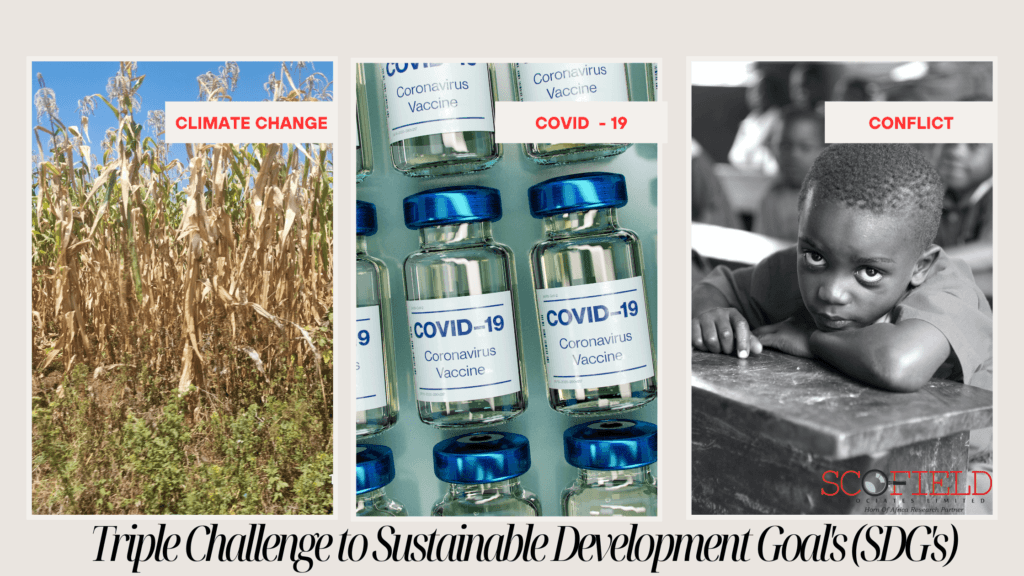Climate Change, Conflict, and Covid-19: The Triple Challenge to Sustainable Development Goals (SDGs) in Africa.
Articles & Insights
July 18, 2023

By
Muliru Yoni
The pursuit of the Sustainable Development Goals (SDGs) in Africa faces a complex trifecta of challenges often referred to as the “three C’s” – Climate Change, Conflict, and Covid-19. These interconnected challenges pose significant obstacles to achieving the SDGs and realizing Africa’s sustainable development aspirations. This synthesis explores the intricate interplay between these challenges and their implications for the attainment of the SDGs, highlighting the need for integrated and targeted strategies to address these critical issues.
Africa is particularly vulnerable to the impacts of climate change, which disrupt ecosystems, strain water resources, and threaten agricultural productivity (IPCC, 2018). It’s vulnerability to climate change is underscored by its reliance on climate-sensitive sectors such as agriculture and natural resources. Rising temperatures and changing precipitation patterns contribute to food insecurity, water scarcity, and increased risk of natural disasters. Erratic weather patterns, prolonged droughts, and extreme events threaten food security, water access, and ecosystem integrity (UNEP, 2019; UNEP, 2021). Such environmental challenges undermine progress toward SDG 13 (Climate Action), SDG 2 (Zero Hunger), and SDG 6 (Clean Water and Sanitation). Climate change disrupts economic growth, deepens inequalities, and exacerbates existing vulnerabilities, particularly among marginalized populations. As SDGs 13 (Climate Action) and 15 (Life on Land) underscore, climate change mitigation and adaptation are integral to sustainable development.
Persistent conflicts hinder the achievement of multiple SDGs, impeding efforts to promote peace, justice, and equality. Armed conflicts disrupt social cohesion, exacerbate poverty, and hinder infrastructure development (UNDP, 2012). Conflict leads to displacement, loss of life, and disruptions to essential services, obstructing efforts to achieve SDGs related to poverty eradication, education, and health (World Bank, 2020). Moreover, the complex relationship between conflict and the environment can lead to resource-driven conflicts that compromise SDG 16 (Peace, Justice, and Strong Institutions) and exacerbate environmental degradation.The links between conflict, fragility, climate change, and underdevelopment underscore the need for peace building and conflict prevention (UNDP, 2019; World Bank, 2020).
The Covid-19 pandemic has exacerbated existing health disparities and exposed weaknesses in healthcare systems across Africa (TIP, 2021). It has unmasked vulnerabilities in Africa’s health systems, exposing disparities in healthcare access and socio-economic resilience. Lockdowns, disruptions to trade, and economic downturns have disproportionately impacted vulnerable populations, exacerbating poverty and inequality. It has compounded challenges across sectors, magnifying existing inequalities and testing governance capacities (UNDP, 2021). The pandemic’s ripple effects threaten progress toward multiple SDGs, including SDG 3 (Good Health and Well-being) and SDG 1 (No Poverty). The pandemic’s multidimensional repercussions highlight the interconnectedness of the SDGs and the need for comprehensive responses (TIP, 2021).
The convergence of the “three C’s” magnifies their combined negative effects, creating a cycle of vulnerability that undermines sustainable development efforts. It intensifies their collective impact, establishing a cycle of vulnerability that obstructs progress towards the SDGs. Climate change can exacerbate resource-driven conflicts, which, in turn, disrupt climate adaptation efforts. Covid-19 amplifies health and socio-economic vulnerabilities, further straining healthcare systems and hampering development progress. This interconnectedness calls for holistic strategies that address these challenges in tandem.
To advance the SDGs amidst the challenges posed by the “three C’s,” comprehensive and integrated approaches are essential. Those approaches should address climate resilience, conflict prevention, and pandemic preparedness concurrently. These strategies should tackle the root causes of conflict, enhance healthcare systems, and prioritize climate adaptation (UNEP, 2021). The recommendation would include the following:
I. Resilient Infrastructure and Ecosystems: Promote climate-resilient infrastructure and sustainable ecosystem management (SDG 9 and SDG 15) to mitigate climate change impacts and reduce conflicts over natural resources. Climate adaptation and mitigation efforts must be mainstreamed into SDG implementation. Investments in climate-resilient infrastructure, sustainable agriculture, and renewable energy contribute to multiple SDGs, fostering a holistic approach to development (UNDP, 2020). Climate-smart agricultural practices (SDG 2) will enhance food security, improve livelihoods, and build resilience to climate change. Furthermore, promoting sustainable land and water management, ecosystem restoration, and climate-smart agriculture can foster adaptation and mitigate climate risks (FAO, 2021). Overall, resilient infrastructure also includes accelerating the transition to renewable energy sources (SDG 7) to mitigate climate change and improve energy access in conflict-affected areas.
II. Peace building and Conflict Resolution: Prioritizing peace building, conflict prevention, and inclusive governance mechanisms is vital. Investments in conflict prevention, mediation, and peace building efforts (SDG 16) should be a norm. Resolving conflicts and preventing new ones can unlock the potential for sustainable development and social cohesion (UNDP, 2021).Additionally, strengthening institutions for peace, justice, and inclusion is crucial. Addressing root causes of conflict, fostering social cohesion, and promoting inclusive governance are imperative to achieving SDG 16 (UNEP, 2021).
III. Healthcare Strengthening: Strengthened healthcare systems is a linchpin for resilience. Enhancing healthcare infrastructure, access, and capacity is vital. Robust health systems are not only central to achieving SDG 3 but also to mitigating the impacts of conflict and pandemics (UNDP, 2021). Strengthening healthcare systems and promotion of universal health coverage (SDG 3) will enhance pandemic preparedness and ensure equitable access to healthcare services. Investments in healthcare infrastructure, capacity-building, and equitable access to healthcare services can mitigate vulnerabilities to health crises and promote well-being (TIP, 2021).
IV. Inclusive Economic Recovery: Inclusive economic recovery strategies (SDG 8) that address poverty, unemployment, and inequality exacerbated by conflicts and the pandemic, should be prioritized. Inclusivity can be enhanced through various facets of development. As a starting point, governments should ensure access to quality education (SDG 4) and promote gender equality (SDG 5) to empower communities and promote social cohesion. By prioritizing education, gender equality, and social protection, Africa can empower marginalized populations, reduce conflict drivers, and foster equitable development (UNDP, 2020).
V. Community Engagement and Partnerships: Foster community engagement, stakeholder partnerships, and multi-sectoral collaboration (SDG 17) to co-create and implement holistic solutions. Collaborative efforts between governments, regional organizations, development partners, and civil society are paramount. Partnerships that address the “three C’s” holistically can amplify impact and promote synergies among SDGs (African Union, 2022).
VI. Digital Inclusion and Innovation: Leveraging digital technologies can bridge gaps exacerbated by the “three C’s.” Digital literacy, e-commerce, and telehealth initiatives contribute to SDGs 9 (Industry, Innovation, and Infrastructure) and 4 (Quality Education) (ITU, 2021).
The “three C’s” – Climate Change, Conflict, and Covid-19 – represent a formidable challenge to the achievement of the SDGs in Africa. Yet, they also present an opportunity for transformative change. By addressing these challenges in a coordinated and integrated manner, African nations can enhance their resilience, promote peace, and accelerate sustainable development. Achieving the SDGs requires collective commitment, innovative solutions, and persistent efforts from governments, civil society, and international partners. Collaborative and holistic approaches, guided by the principles of Agenda 2030, hold the potential to build resilience, enhance peace, and foster socio-economic progress. While the road ahead is complex, the “three C’s” can serve as catalysts for innovation, resilience, and a more prosperous future for all Africans.
He is a researcher, program manager and M&E specialist in the Horn of Africa. His research focuses on the prevention and countering of violent extremism (P/CVE), border security, rehabilitation, and reintegration (DDR), migration, and climate change.
Muliru Yoni
Director - Scofield Associates

